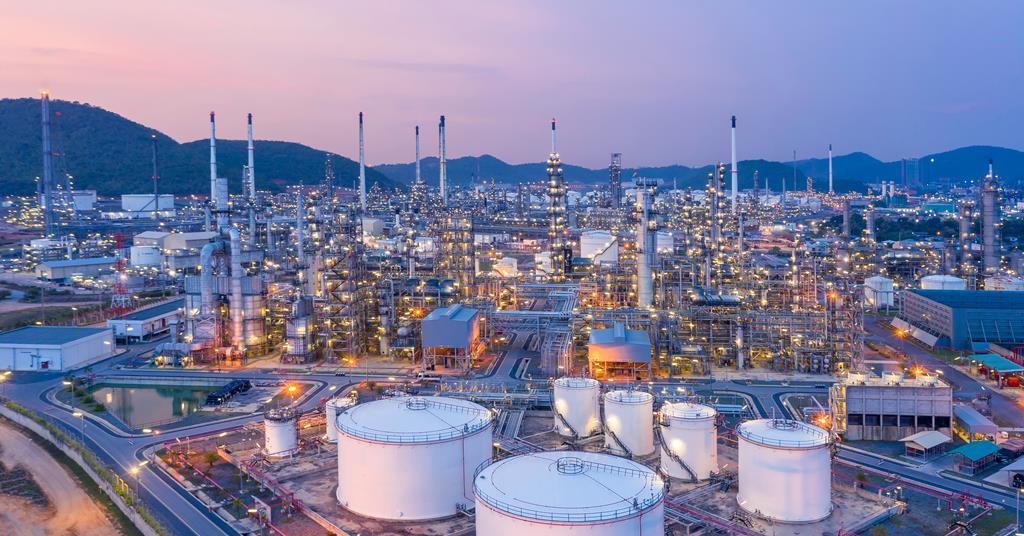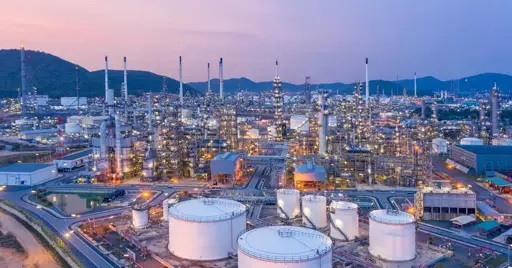Polymer membrane separates hydrocarbons, offering alternative to distillation
-
This post did not contain any content.

Polymer membrane separates hydrocarbons, offering alternative to distillation
Microporous membrane enables energy efficient chemical separations

Chemistry World (www.chemistryworld.com)
-
 S Science shared this topic on
S Science shared this topic on
-
This post did not contain any content.

Polymer membrane separates hydrocarbons, offering alternative to distillation
Microporous membrane enables energy efficient chemical separations

Chemistry World (www.chemistryworld.com)
Last time I heard about reverse osmosis it was about water purification, exploiting that water molecules are tiny and ions + organic molecules are bulky. I’m glad to see the tech finding its way into other processes though - specially oil refining, the current solution (fractional distillation) is basically “use lots of energy to boil it, then use even more energy to condensate it”.
They achieve this using membranes produced by interfacial polymerisation. This technique, which traditionally involves dissolving the two monomers – one in water and one in an organic solvent – to form a crosslinked polymer at the interface, is therefore highly attractive for scalable production of hydrocarbon-separation membranes.
That’s quite smart.
-
Last time I heard about reverse osmosis it was about water purification, exploiting that water molecules are tiny and ions + organic molecules are bulky. I’m glad to see the tech finding its way into other processes though - specially oil refining, the current solution (fractional distillation) is basically “use lots of energy to boil it, then use even more energy to condensate it”.
They achieve this using membranes produced by interfacial polymerisation. This technique, which traditionally involves dissolving the two monomers – one in water and one in an organic solvent – to form a crosslinked polymer at the interface, is therefore highly attractive for scalable production of hydrocarbon-separation membranes.
That’s quite smart.
I’m not as confident. Refining columns work reliably for decades requiring just a couple trays being replaced every now and then. RO membranes are generally fickle, need a lot of babying and require complete replacement every couple years.
There’s also energy integration opportunities in a refinery to use the “waste” heat to preheat feeds and of course the feeds precool the hot top stream. Being a highly commoditized market pushes companies to drive three bottom line down.
I think we’ll only see meaningful impact by phasing out of fossil fuels, not making their manufacture incrementally more efficient.
-
I’m not as confident. Refining columns work reliably for decades requiring just a couple trays being replaced every now and then. RO membranes are generally fickle, need a lot of babying and require complete replacement every couple years.
There’s also energy integration opportunities in a refinery to use the “waste” heat to preheat feeds and of course the feeds precool the hot top stream. Being a highly commoditized market pushes companies to drive three bottom line down.
I think we’ll only see meaningful impact by phasing out of fossil fuels, not making their manufacture incrementally more efficient.
I’m aware some energy is recycled, and I do think we (humankind as a whole) need to phase fossil fuels out. But even then, we’ll still need petrochemicals - and I’m hoping this sort of membrane eventually makes them cheaper, when used instead or alongside fractioning columns.
-
I’m aware some energy is recycled, and I do think we (humankind as a whole) need to phase fossil fuels out. But even then, we’ll still need petrochemicals - and I’m hoping this sort of membrane eventually makes them cheaper, when used instead or alongside fractioning columns.
Do we really need petrochemicals, though? Or do we like the cheap products made from them? Because humanity went by just fine without them until a century ago.
-
Do we really need petrochemicals, though? Or do we like the cheap products made from them? Because humanity went by just fine without them until a century ago.
Not that fine, though. Quality of life came a long way.
-
Not that fine, though. Quality of life came a long way.
Not because of petrochemicals. Fertilizers, agriculture mechanization, and medicine are the key factors. Plus we could do without all the microplastics and PFAS on my blood.
-
Do we really need petrochemicals, though? Or do we like the cheap products made from them? Because humanity went by just fine without them until a century ago.
Hydrogen from syngas (thus ammonia), sulphur (thus sulphuric acid), ethylene, benzene, and so many others, they’re used for absolutely everything: fertilisers, medication, explosives, solvents, detergent, dyes. Even a good chunk of the industrial ethanol comes from ethylene.
And as you hinted, plastics. We still need them for water tubes, computers, and everything else.
So even in a future where we stop doing stupid shit like literally burning old dino juice, and we reduce the amount of plastics to reasonable levels, we’re still going to need petrochemicals.
-
Hydrogen from syngas (thus ammonia), sulphur (thus sulphuric acid), ethylene, benzene, and so many others, they’re used for absolutely everything: fertilisers, medication, explosives, solvents, detergent, dyes. Even a good chunk of the industrial ethanol comes from ethylene.
And as you hinted, plastics. We still need them for water tubes, computers, and everything else.
So even in a future where we stop doing stupid shit like literally burning old dino juice, and we reduce the amount of plastics to reasonable levels, we’re still going to need petrochemicals.
Alright, I don’t think we’re understanding each other.
Yes, the primary source of hydrogen nowadays is oil, but it doesn’t have to be. We can electrolyze water for that. We can also use modern alternatives to monoculture that do not deplete the soil.
Sulfur can be mined without resorting to the oil chain.
I don’t know why you mentioned ethylene. It is used as a ripening agent, but we can simply wait for fruit to ripen on their own, with the added benefit that they would develop their flavor instead having the bland taste we currently get at the supermarket.
Medication, explosives, detergents, dyes come from the chemical industry, and yes, there’s an important difference.
Solvents and paints are something harder to replace, but there are some plant based alternatives being used in very niche applications.
All of the alternatives are not being used today because it’s more expensive. And they’re more expensive because they don’t have a century of research dedicated to make them cheaper like oil has.
We don’t NEED oil. It’s just more convenient, it allows us not to change the status quo, to not think about different ways we should live. With oil, we can put our head in the sand and pretend we’re not careening to our own demise.
-
I’m aware some energy is recycled, and I do think we (humankind as a whole) need to phase fossil fuels out. But even then, we’ll still need petrochemicals - and I’m hoping this sort of membrane eventually makes them cheaper, when used instead or alongside fractioning columns.
There’s research into non-oil based polymers in Akron funded by the Biden administration (don’t tell Trump) and Goodyear IIRC. So … if that goes somewhere, maybe not.
-
Alright, I don’t think we’re understanding each other.
Yes, the primary source of hydrogen nowadays is oil, but it doesn’t have to be. We can electrolyze water for that. We can also use modern alternatives to monoculture that do not deplete the soil.
Sulfur can be mined without resorting to the oil chain.
I don’t know why you mentioned ethylene. It is used as a ripening agent, but we can simply wait for fruit to ripen on their own, with the added benefit that they would develop their flavor instead having the bland taste we currently get at the supermarket.
Medication, explosives, detergents, dyes come from the chemical industry, and yes, there’s an important difference.
Solvents and paints are something harder to replace, but there are some plant based alternatives being used in very niche applications.
All of the alternatives are not being used today because it’s more expensive. And they’re more expensive because they don’t have a century of research dedicated to make them cheaper like oil has.
We don’t NEED oil. It’s just more convenient, it allows us not to change the status quo, to not think about different ways we should live. With oil, we can put our head in the sand and pretend we’re not careening to our own demise.
I think the main difference is that you’re probably focusing on a longer term than I am.
I do think we [humankind] need to get rid of our reliance on petrochemicals, but that process might take centuries; in the meantime, if the tech in the OP gets well developed, we might see the benefits already in our lifetimes. One thing doesn’t exclude the other, so I think we should be chasing both.
With that in mind:
All of the alternatives are not being used today because it’s more expensive. And they’re more expensive because they don’t have a century of research dedicated to make them cheaper like oil has.
Kind of.
Hydrogen from electrolysis is expensive because it relies on huge amounts of electricity; and unless the electricity itself is “clean”, we’re simply shifting the problem elsewhere (e.g. burning natural gas for electricity for hydrogen, instead of simply reacting that natural gas with water). So we actually need to wait until clean electricity becomes even cheaper to solve this.
IMO we should rely more on legumes for nitrogen fixation, but I don’t think it’ll fix (eh) the issue completely. Also note that ammonia isn’t just fertilisers, it’s also everywhere in the industry, from cleaning agents to cooling systems. (It sucks in comparison with CFC, but at least it doesn’t leave a hole in the ozone layer.)
People used to mine sulphur. It costs more, it’s hell for the workers, and deposits aren’t that common.
Ethylene is used almost everywhere in the industry. Not just for fruit ripening and polymers; pharmaceuticals, solvents, even detergent uses it. It’s one of those building blocks in organic chemistry, alongside benzene and inorg junk. Industrially it’s also used to produce ethanol; and while you can produce ethanol from biomass instead, you’ll either need to
- Rely even more on big sugarcane farms, like the ones responsible for the initial desertification of the Brazilian Northeast. (Sugarcane fucks the environment.)
- Produce it from maize and other grains. Supply and demand, again - it makes them even more expensive.
Also note how this interacts with the ammonia issue. Like any other plant-based solution; they’re still encouraging monoculture.
We don’t NEED oil. It’s just more convenient, it allows us not to change the status quo, to not think about different ways we should live. With oil, we can put our head in the sand and pretend we’re not careening to our own demise.
Currently we need it to keep our current life standards, and I don’t think most people are willing to give up. And while I do think we [humans] should stop pretending we’re digging our own collective grave, some things are only practical in the long run, but we still need to do things to help out in the short run.
(And by “we” I don’t even mean those parasites wasting resources so they can say “I’m an astronaut now!” or to build memecoin “mining” rigs. We’d solve a lot of the issue if we got rid of them first.)
-
There’s research into non-oil based polymers in Akron funded by the Biden administration (don’t tell Trump) and Goodyear IIRC. So … if that goes somewhere, maybe not.
I hope this research leads to the replacement of some oil-based polymers. And, additionally, I think we should decrease our reliance on industrial polymers,
my balls already have enough microplastics;even if they come from a cleaner source, their presence in nature is problematic.
